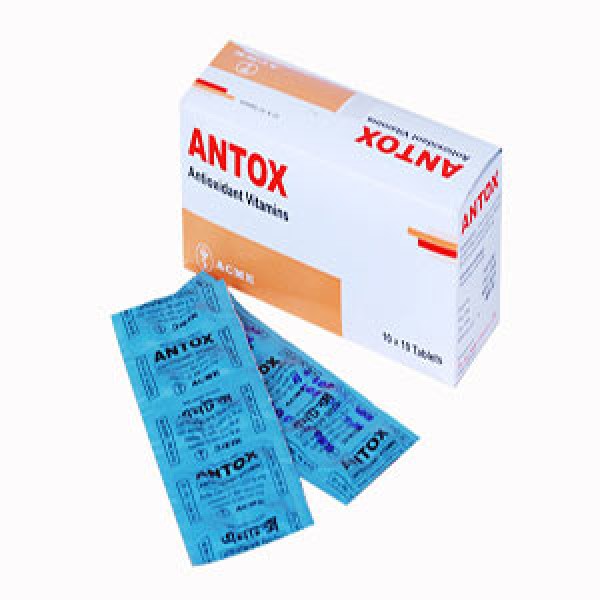
- Stock: In Stock
- Brand: Acme Laboratories Limited
- Product ID: Betacarotene + Vitamin C + Vitamin E
100% Secure Payment

Antox
Indications
Antioxidant vitamins are used in a wide range of conditions where free radical damage is playing a role. Antioxidant vitamin combination is used in the prevention of coronary heart diseases, certain types of cancer, aging as well as free radical damage caused by excessive exercise, illness, certain medications, air pollution, smoke, radiation and pesticides. The main role of the antioxidant vitamins is as follows:
β carotene prevents free radical formation by quenching singlet oxygen, a highly reactive form of oxygen. Vitamin C is another free radical scavenger which deactivates free radicals. It works specially in the plasma, lung fluid, aqueous humour and interstitial fluid. It can increase white blood cell activity; play important roles in the biochemistry of antibodies, prostaglandin E 1 , B and T lymphocytes, and interferon. Vitamin E also scavenges free radicals in the blood along with β carotene and vitamin C. Moreover, vitamin E is essential to protect against some of the ill effects of smog and smoke. In relation to other nutrients vitamin E protects vitamin A from being destroyed in the body.
Pharmacology
Beta carotene of this tablet is converted to vitamin A (Retinol) when required. Retinol has several biochemical functions e.g. on retina, growth, tissue differentiation, immunological response. It has also some anti-cancer activity.
Vitamin C is the most powerful reducing agent known to be present in living tissues. Vitamin C deficiency produces scurvy. It is a cofactor in numerous biological processes. Vitamin C and molecular oxygen are essential for the conversion of proline to hydroxyproline, dopamine to noradrenaline . Vitamin C is also essential for the synthesis of adrenal steroid hormones. Vitamin C is important in the defense against infection and studies shown that vitamin C is important for the normal functioning of T-lymphocyte and leukocyte. Ascorbic acid has some antiinflammatory activity and protects cells against oxidation of essential molecules. In high doses, (1-2 g daily) ascorbic acid increases iron absorption.
vitamin E seems to be as a defense against oxidative stress and lipid peroxidation. In most cell membranes there is one molecule of tocopherol for every 1000 lipid molecules. Tocopherol mops up peroxide radicals and then needs a supply of reduced hydrogen to restore the steady-state situation. This is usually supplied by ascorbic acid or reduced glutathione.
Interaction
Cholestyramine, Colestipol, Neomycin cause decreased absorption of β carotene. Circulating vitamin C levels have been shown to be reduced during prolonged administration of oral contraceptives containing Oestrogen, Tetracycline and Aspirin. The decrease in vitamin C level may be due to drug induced impaired absorption or increased utilization of the vitamin for drug metabolism. Vitamin E may enhance the anticoagulant activity of anticoagulant drugs. High doses of vitamin E can impair intestinal absorption of vitamins A and K.
Side Effects
β carotene is comparatively safe even at high and prolonged exposure. Individuals who routinely ingest large amounts of carotenoids can develop hypercarotenosis, which is characterised by a yellowish colouration of the skin and a very high concentration of carotenoids in the plasma. This benign condition, although resembling jaundice, gradually disappears upon correcting the excessive intake of carotenoids.
Vitamin C is generally a safe drug for human use in normal doses. Larger doses may lead to gastrointestinal tract upset and renal stone formation.
Vitamin E is considered safe even in large doses. Doses over 800 mg may cause diarrhoea, abdominal pain or cramps, fatigue and reduced resistance to bacterial infection and transiently raised blood pressure.






























